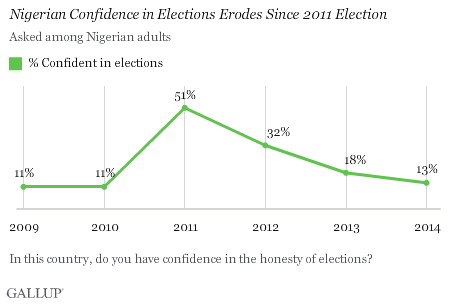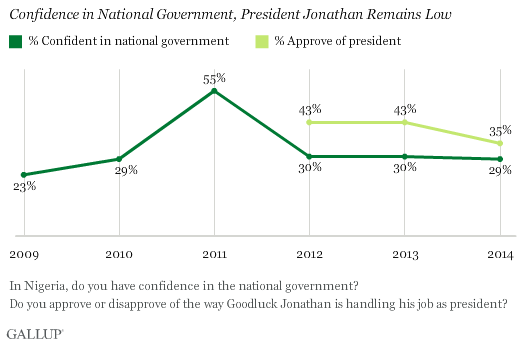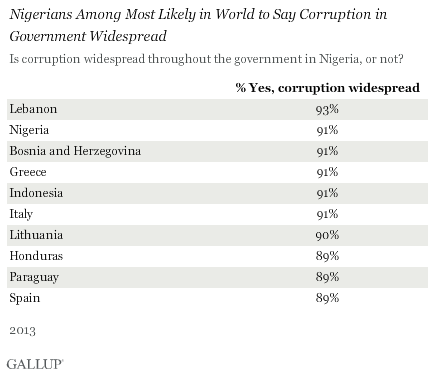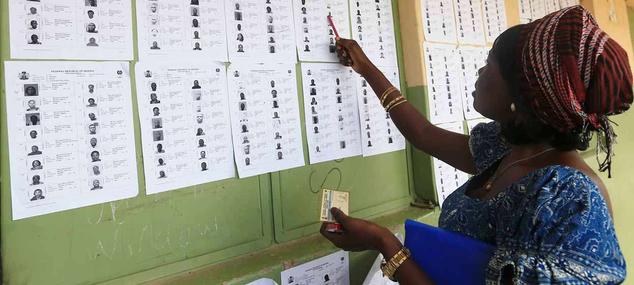Story Highlights
- Few Nigerians confident in elections' honesty
- Support for government nearly halved since 2011 election
- About nine in 10 view government corruption as widespread
WASHINGTON, D.C. -- As Nigerians prepare to head to the polls in February for the fifth time since their country returned to civilian rule in 1999, only 13% express confidence in the honesty of elections. Nigerians who don't approve of the country's leadership are even more skeptical, with 8% confident in the fairness of elections.

The fairness of Nigeria's elections has been widely contested since the country's transition from military rule. Accusations of vote rigging and intimidation largely discredited the 2003 and 2007 votes, with European Union observers commenting that the 2007 general elections were the worst they had seen anywhere in the world. As a result, faith in the country's electoral process remained low until after Nigeria's successful 2011 national election, when half of adults (51%) expressed confidence. However, since that time, confidence in elections has steadily fallen each year.
Flagging confidence in the electoral process is just one challenge facing incumbent presidential candidate Goodluck Jonathan in the general elections. Since taking office in 2011, Jonathan's own job approval rating has remained consistently low, standing at 35% in 2014. Confidence in the national government has fallen significantly since the last general election as well, at 29% in 2014, down from a high of 55% in the months after the 2011 election.

Frustration over the Nigerian government's response to the Boko Haram insurgency and accusations of widespread corruption have both figured as prominent issues on the campaign trail. In late December, opposition candidate Muhammadu Buhari lamented the sentencing to death of 54 Nigerian soldiers who refused to fight Boko Haram in the country's northeast. Some critics of the decision say that corruption has crippled the military's ability to fight the insurgency, with soldiers often ill-equipped and outgunned against the Islamist militants, despite what they call ample funding.
Nearly nine in 10 Nigerians (86%) say corruption is widespread in their government. This is similar to the 91% who felt this way in 2013, when Nigerians were the second-most likely in the world (out of 127 countries) to respond this way.

Bottom Line
Africa's largest population and economy heads to the polls at an important moment in its history. Facing widespread corruption, large-scale unemployment and Boko Haram insecurity, Nigeria needs credible elections to maintain the country's cohesion and prove its democratic legitimacy to itself and the world.
As a Christian from the South, Jonathan's decision to run for re-election has heightened tensions, as expectations that the presidency should now go to a northerner increases the potential for post-election violence, a phenomenon that has accompanied every major poll in Nigeria's recent history. Recent controversies over preparations to the voter register and the potential disenfranchisement of millions of Nigerians in Boko Haram territory have also re-ignited concerns over elections' fairness at this sensitive time. An election perceived to be illegitimate in Africa's most populous country not only risks renewed violence but threatens to exacerbate the country's governance crisis, with implications for the wider region.
Survey Methods
Results are based on approximately 1,000 face-to-face interviews each wave with adults, aged 15 and older, in Nigeria. Surveys were conducted with 1,000 respondents from July 15-Aug. 6, 2009; March 19-April 4, 2010; July 23-Aug. 4, 2011; Feb. 15-March 7, 2012; Nov. 2-Nov.19, 2012; May 4-July 8, 2013; and May 16-June 3, 2014. For results based on the total sample of national adults, one can say with 95% confidence that the margin of sampling error is ±3.9 percentage points. The margin of error reflects the influence of data weighting. In addition to sampling error, question wording and practical difficulties in conducting surveys can introduce error or bias into the findings of public opinion polls.
Learn more about how the Gallup World Poll works.

